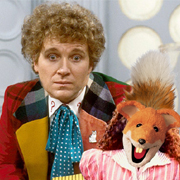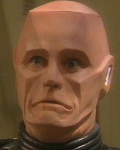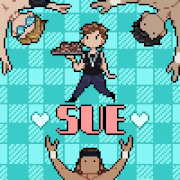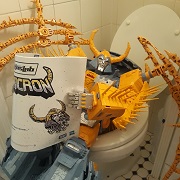|
ThaGhettoJew posted:It was an ideal treaty- one between two powers willing to come to the bargaining table. ZISIS here was unwilling to be bound by the rationale or rationality that the majority seemed mostly okay with. Yeah, why couldn't they just accept being murdered those selfish bastards
|
|
|
|

|
| # ? May 16, 2024 11:35 |
|
ThaGhettoJew posted:It was an ideal treaty- one between two powers willing to come to the bargaining table. Yeah, the "perfect" part was that the Doctors removed the knowledge of which side was which. So everybody involved had to come up with a solution they could all live with, because if it turned out they guessed wrong about who they were and tried to balance the terms in their favor, there was a chance they'd find themselves on the losing end. If the show had left it at that, it would have held up fine. There's certainly interesting stories that can be told about how things stand AFTER the treaty was signed, but these episodes not only mishandled that but also created the impression that the Zygons got the (very) short end of the stick. Part of that is down to the fact that we see no evidence of the "majority" Zygons in the first episode, and the singular look we can in part 2 comes too late and is too little. Jerusalem fucked around with this message at 13:41 on Feb 20, 2016 |
|
|
|
Jerusalem posted:Yeah, the "perfect" part was that the Doctors removed the knowledge of which side was which. So everybody involved had to come up with a solution they could all live with, because if it turned out they guessed wrong about who they were and tried to balance the terms in their favor, there was a chance they'd find themselves on the losing end. Yes, all of this. Going back to the well was not a very good idea, and certainly not with Harness at the helm. Even with Moffat's supervision. MrL_JaKiri posted:Yeah, why couldn't they just accept being murdered those selfish bastards I thought the main complaint behind the insurrection was they were tired of/humiliated by having to assimilate with the ignorant humans and live like cave-Zygons. If only the law allowed them to wear their tentacle burkas openly... Basically the whole premise behind the episode pair is fundamentally flawed and far too easy to make into a weird racist and bigoted screed. I like a couple of the acting bits. and other than that it's pretty much rubbish throughout.
|
|
|
|
They could probably have patched it up somewhat by having Osgood mention at the end that they're getting a settlement project together for some currently uninhabited islands or something, so the Zygons will have somewhere they can be themselves, but then again that would have betrayed the intended pro-immigrant narrative by implying that immigrant populations can't openly express themselves and be tolerated by natives. I don't know, maybe make a joke out of it: "there's this tribe on the island of Mabuntu who believe the gods look like giant rubbery dildos, so we've decided to make contact on behalf of the United Kingdom". It's tough to come up with an ending that makes both sides happy in a non-ridiculous way ("turns out zygons walk among us and nobody minds!" for example, would have worked on another planet or in the distant future or something but not present day The World) and imparts the correct moral message to the kids, and maybe they shouldn't have tried.
|
|
|
|
Jerusalem posted:Yeah, the "perfect" part was that the Doctors removed the knowledge of which side was which. So everybody involved had to come up with a solution they could all live with, because if it turned out they guessed wrong about who they were and tried to balance the terms in their favor, there was a chance they'd find themselves on the losing end. From what we see in New Mexico, it's probably that Zygons were allowed to settle freely wherever, but they were viewed with suspicion by the locals, or accidentally changed, which isn't something the initial treaty could have really accounted for.
|
|
|
|
Rochallor posted:From what we see in New Mexico, it's probably that Zygons were allowed to settle freely wherever, but they were viewed with suspicion by the locals, or accidentally changed, which isn't something the initial treaty could have really accounted for. Which still makes me groan as New Mexico is one of the more tolerant states in the US. Arizona would have been a much better choice. Hell, use "Tombstone' instead of "Truth or Consequences!"
|
|
|
|
Toxxupation posted:Okay, no. The Doctor is absolutely the moral compass of DW, and always has been. The messages he imparts are either the moral of the episode, period, or betray the moral of the episode by being illustrative of how morally flawed he is. "Inversion" does neither, the framing and narrative language the episode employs around the climax is unambiguously good. The Doctor has been shown to be both morally flexible, onscreen ("The Runaway Bride"), and the show has specifically condemned his viewpoint and perspective, even when he's right ("The Girl Who Waited"). "Inversion" does neither, it presents The Doctor's speech as moralistic and justified from beginning to end, and ends the episode on an unambiguously happy note. If you are onboard with "Inversion", you accept the ending that The Doctor belittles and removes the agency of a justified, admittedly extremist, minority as "happy". And if you do that, you are defending an authoritarian, antidisestablishmentarian, resolution as both earned and positive. There are no ifs, ands, buts, or caveats. Believe me. I looked for them. The third act hammers the point home in an obscenely long, virtually unbroken scene of Capaldi repeatedly abusing the minority character with zero screentime given to even a throwaway admission that, philosophically speaking, Bonnie's actions are justified. Part of the divergence here is that DoctorWhat has seen the classic series (I'm guessing in its entirety), where the Doctor doesn't even start out as the main character and where his status as moral compass is highly questionable and sustained over only brief periods of time. The Third and Fourth Doctors would certainly sustain that claim, but the Fifth and Sixth were designed in part to undercut it. Likely coupled to that is a divergence in approach between looking for your evidence within the episode itself and reading this story's portrayal of the Doctor as undermined by other stories. The former approach means seeing the disjunction between the cheerful "let's overthrow the government" Doctor of other episodes and this one's authoritarian Doctor as another sign of this story's betrayal of the series and the character. Taking the latter approach is almost necessary once one expands the range of eligible stories for comparison to the entire classic series as well as the 21st century series, though I suspect it also rests upon an ultimate approval of the "I Never Would," pacifist revolutionary Doctor over a more anarchic and proactive model we see on screen some of the time. Arguably, the end of this particular season suggests that Twelve may be all too prepared to casually overthrow any authoritarian structure he's not personally attached to while excepting himself from the same phenomenon, which opens up the possibility that the Doctor isn't defending the establishment as a general principle but HIS establishment specifically: revolution is fine as long as it isn't aimed at me. Even then, the series relies on future episodes to undercut the main message here instead of calling it into question within the episode itself. And actually, all that was needed was for Bonnie to achieve some part of her agenda. Of course, her agenda degenerated from a reasonable desire for Zygons to be able to exist uncloseted without being brutally murdered to a desire for open war, so that was a problem. But the end achieved was a pretty violent return to the status quo ante. If you consider that the two Zygon leaders we meet in Invasion were almost certainly the LAST set of revolutionaries who won through to the Osgood boxes and got talked into being Doctor-surrogates by the Doctor, one can see pretty clearly why this cycle has repeated itself so often. There is actually a really sharp reading of these two episodes that points out how their internal logic ultimately collapses in a way which totally refutes that awful and regressive worldview, but I don't see any way to claim Harness meant to offer it. It starts with the observation that, following the "most perfect" deal, the Zygons have in a period of only a few years experienced sixteen internal revolutionary events, all of which presumably involved both Zygon and human deaths, and all of which led to two people standing at a table in front of two empty boxes. Those people were never the Doctor and the revolutionary, or the current Zygon leader and the revolutionary, but always Kate Lethbridge-Stewart and the revolutionary. And they never negotiated: nothing could change because the agent for humanity could never even remember the revolution afterward. The Doctor condemns Bonnie because she's just going to replace an oppressive regime with her own oppressive regime that will only last until the next revolutionary comes along to replace her. After she repents she's put in charge of the same old oppressive regime, with an established pattern suggesting that she will soon be replaced by the next revolutionary. There's a bullet dodged. Ponder, too, the implications of episodes which first insist that the Zygons have gotten so much better at duplicating people that they don't need the original bodies and can snatch information telepathically (from drone operators, at long distance: I'd have been happier if they'd been using Facebook, personally), and then has Kate pretend to be a Zygon duplicate of herself. Do the Zygons really have no ability to distinguish between themselves and humans, despite their well-developed telepathic powers? Isn't this just part and parcel of a story which insists that the Zygons have to understand what it is to be human and to assimilate, while never asking any single human to understand anything about the Zygons, except MAYBE for Osgood? Osgood insists repeatedly that it doesn't matter if she's the human or the Zygon, but that's a lie: if she's a human trying to think like a Zygon, she's not only the sole instance of empathy in that direction but she's also not to blame for not looking like a Zygon (because she can't). One would have to ask, though, why she's not looking out for Zygon interests as surely upholding the agreement requires tending to the needs of both groups?
|
|
|
|
I just like how we've gone from a newbie that loathed the idea of Doctor Who to a guy lecturing everyone else on what Doctor Who is and is not.
|
|
|
|
Might want to cut out any discussion of the rest of the season there Narsham.
|
|
|
|
The implication is that the Doctor has reset Kate and Bonnie fifteen times, not that there have been fifteen revolutions. There's a device in the ceiling of the room that wipes people's memories, remember? He just kept resetting that one conversation until he got it right. Or "right", I guess.
|
|
|
|
Dabir posted:lol didn't Moffat literally come out and say that the peace treaty they agreed in Day was The Most Perfect Possible Treaty or something? No he didn't! CHARACTERS said that. Characters, the Doctor specifically, asserted as to the perfection of the Treaty. And characters can be wrong.
|
|
|
|
DoctorWhat posted:No he didn't! CHARACTERS said that. Characters, the Doctor specifically, asserted as to the perfection of the Treaty. Awfully Watsonian of you.
|
|
|
|
Oxxidation posted:Awfully Watsonian of you. There's a difference between treating characters as actual people within a fictional universe and acknowledging that the beliefs expressed by characters do not intrinsically equate to Absolute Narrative Truth. It's not a retcon or an "inconsistency" for the treaty to be busted as gently caress.
|
|
|
|
DoctorWhatson
|
|
|
|
Narsham posted:the classic series I fundamentally disagree with your statements about the original run, barring the first three serials.
|
|
|
|
Oxxidation posted:Awfully Watsonian of you.
|
|
|
|
Toxxupation posted:Okay, no. The Doctor is absolutely the moral compass of DW, and always has been. The messages he imparts are either the moral of the episode, period, or betray the moral of the episode by being illustrative of how morally flawed he is. "Inversion" does neither, the framing and narrative language the episode employs around the climax is unambiguously good. The Doctor has been shown to be both morally flexible, onscreen ("The Runaway Bride"), and the show has specifically condemned his viewpoint and perspective, even when he's right ("The Girl Who Waited"). "Inversion" does neither, it presents The Doctor's speech as moralistic and justified from beginning to end, and ends the episode on an unambiguously happy note. If you are onboard with "Inversion", you accept the ending that The Doctor belittles and removes the agency of a justified, admittedly extremist, minority as "happy". And if you do that, you are defending an authoritarian, antidisestablishmentarian, resolution as both earned and positive. There are no ifs, ands, buts, or caveats. Believe me. I looked for them. The third act hammers the point home in an obscenely long, virtually unbroken scene of Capaldi repeatedly abusing the minority character with zero screentime given to even a throwaway admission that, philosophically speaking, Bonnie's actions are justified. That's true, but the Zygon story line didn't start in these two episodes. They aren't immigrants, they are invaders. Invaders who actually arrived five hundred years ago, but decided earth civilizations of the time were too primitive, so they hid in paintings until iphones were invented. They would have had no trouble conquering England (maybe the world) back in the 1500s. Lazy rear end alien invaders waited a bit too long and humans developed weapons possibly capable of beating them. Presumably the Doctor could have moved them to a planet not already inhabited by a sapient species, like that planet where he dropped off the Dinosaurs in a Spaceship. But that's not what they want either. They don't want to colonize a new planet of their own, they wanted to conquer a technologically comfortable civilization. The treaty had them settle for being living in the world pretending to be humans, instead of ruling the world, and most of them were okay with that compromise.
|
|
|
|
Narsham posted:Part of the divergence here is that DoctorWhat has seen the classic series (I'm guessing in its entirety), where the Doctor doesn't even start out as the main character and where his status as moral compass is highly questionable and sustained over only brief periods of time. The Third and Fourth Doctors would certainly sustain that claim, but the Fifth and Sixth were designed in part to undercut it. As someone who grew up watching Classic Who and has seen every episode multiple times, this has no bearing on these two stories at all. The Doctor has been the moral compass of the show pretty much since Ian and Barbara left, and that part of his characterization has remained mostly consistent since then. These were just two stories that either botched their intended message or - more troubling - said exactly what they intended to say. Either way, I would prefer if Harness didn't write for the show again 
Jerusalem fucked around with this message at 22:48 on Feb 20, 2016 |
|
|
|
Toxxupation posted:this is now the fire emblem thread
|
|
|
|
Ladies and gentlemen, presenting: https://www.youtube.com/watch?v=PiYuq6Ac3a0 A more coherent message than this 90 minutes of The Doctor Who.
|
|
|
|
Paul.Power posted:Fire Emblem's all right and all, but you can probably guess from my avatar which series I'm really waiting for Intelligent Systems to develop a new entry for. Even if a typical Advance Wars plot falls apart under scrutiny even faster than this two-parter's did... Hmm, okay, but counterpoint: 
|
|
|
|
Jerusalem posted:As someone who grew up watching Classic Who and has seen every episode multiple times, this has no bearing on these two stories at all. The Doctor has been the moral compass of the show pretty much since Ian and Barbara left, and that part of his characterization has remained mostly consistent since then. Written like someone who hasn't watched Attack of the Cybermen recently. Dabir posted:Might want to cut out any discussion of the rest of the season there Narsham. Happy to if Oxx thinks that what I've written amounts to spoilers. I tried to be as vague as possible. Narsham fucked around with this message at 01:14 on Feb 21, 2016 |
|
|
|
Narsham posted:Written like someone who hasn't watched Attack of the Cybermen recently. That's the issue of it being a bad story, not a consistent piece of characterization for the Doctor. It's bogged down in unnecessary and confusing continuity-references, the Doctor is sidelined in favor of the writer's pet character and his own characterization is very poorly handled. Much like these two stories, it's bad because it is handled incredibly poorly, and goes against much of what defines the Doctor as a character. Time and the Rani is awful too, that doesn't make it representative of Who as a whole. They shouldn't have let Pip 'n' Jane write any more stories for Who back then, and they shouldn't let Harness do it now either.
|
|
|
|
Narsham posted:Written like someone who hasn't watched Attack of the Cybermen recently. I have (well, in the last 6 months or so). It's the Doctor acting like a jerk and then realising at the end that he hosed up by being a jerk. Not exactly comparable.
|
|
|
|
Jerusalem posted:That's the issue of it being a bad story, not a consistent piece of characterization for the Doctor. It's bogged down in unnecessary and confusing continuity-references, the Doctor is sidelined in favor of the writer's pet character and his own characterization is very poorly handled. Much like these two stories, it's bad because it is handled incredibly poorly, and goes against much of what defines the Doctor as a character. No, it's not just Attack being a badly written episode. It's a mixture of JNT's anti-hero direction and Saward's fascination with non-Doctor characters. After stabilizing, the Sixth Doctor is still cheerfully willing to dispose of (fake) policemen, shows no particular aversion to Cybermen being killed with their own weapons (compare to the Fifth in Earthshock), and declares that he misjudged Lytton despite the latter not exactly using moral means to achieve his ends. And while he's determined to rescue Lytton before the Cyberbase blows up, he doesn't show any concern about any of the other (non-Peri) characters. Mummy on the Orient Express this isn't. There's a deliberate decision to call the Doctor's judgment into question. How can't there be, when the Doctor's capping comment involves his massive misestimation of another character? This fits Toxx's definiton as "moral of the episode presented at the end by the Doctor being wrong," I suppose, but the whole story seems disinterested in morality and I'm not sure what the lesson is supposed to be from that perspective. It's really about Lytton's machismo in counterpoint to the fascist-macho Cybermen, a point about character and honor that has basically nothing to do with Baker's character throughout the story. This doesn't happen all the time, but often enough that it's worthy of mention. In the new series, Dalek (and the whole of the Ninth Doctor's run, for that matter) clearly puts the Doctor's moral compass under scrutiny, but it's arguably more interested in what's happening to Rose and how she can teach the Doctor instead of learning from him. Ten's first day sees him kill an invading alien leader with the declaration "No second chances" and then depose a prime minister; I don't think you can simply read the episode as unambiguously endorsing the Doctor's actions, or claim that the moral lands squarely within his hands. We're meant to feel uncertain. In some of these cases, the dramatic center involves choices made by those around the Doctor (Rose, Amy and River in particular), though in some of those cases the Doctor stands as an unambiguous moral example. Nevertheless, I think it's a reflection of Moffat's interest in the Doctor as moral compass that the whole series is being seen through that perspective. In the old series, discounting the First Doctor: the Second Doctor is sometimes a reluctant hero, to the extent that he has to be compelled to help people out. Troughton typically plays it as coyness, which helps, but his reluctance in an episode like Enemy of the World 1 mirrors his behavior in several of his many lost stories. He's generally willing to preside over the mass death of aliens so long as they're "monsters," a character trait reversed in the Third and Fourth Doctors. Cue the Hulke/Dicks-driven speech to the Time Lords in The War Games, where the Doctor articulates a moral and ethical obligation to intervene. The Third and Fourth Doctors generally uphold it, though not without some unevenness, but the Fifth sometimes focuses on his attempt to develop his moral center, not on his status as a moral authority. Kinda and Snakedance are the most obvious examples, but other episodes also confront the Fifth Doctor with moral dilemmas which pressure him as a moral agent. Compulsion is arguably necessary in Mawdryn Undead, while in Arc of Infinity it's not altogether clear what the "right" response ought to be, and Five is clearly almost as devastated at Omega's fate as he is at the end of Warriors of the Deep (no doubt because he's just had to appear in Warriors of the Deep). In Resurrection of the Daleks he's compromised in a way Four resisted under similar circumstances, which will just get worse by the time Six confronts the Daleks. Let's not even talk about Trial of a Time Lord. Really, it's a series where the main character frequently condemns xenocide, except for those episodes where he commits it. That's not an attack on the show, it's a claim that the central character doesn't always have a consistent moral system in place, and isn't always assumed to be an unquestioned moral authority. On average, across the whole of the classic and new series, it is possible to articulate a basic moral center, but even that gets interrogated, including in the most recent season. That the Harness' two-parter takes the Doctor as an unchallenged moral compass proves nothing about how the character is treated over the whole of the series. Many of the Doctor's companions question his moral decisions, and the defining moments of the character see him interrogating his own morality as well. But some of the time, the show's a rollicking adventure and the morality of the Doctor's actions simply aren't a centerpiece of the story, or in some cases, even an identifiable element of it. MrL_JaKiri posted:I have (well, in the last 6 months or so). It's the Doctor acting like a jerk and then realising at the end that he hosed up by being a jerk. Not exactly comparable. I wasn't comparing it to Invasion/Inversion. I was just disagreeing that the series always places the Doctor as a moral compass, not that it doesn't do that in the Harness two-parter. This is a discussion of that small part of my original post that got a response. Do you really think that acting like a jerk and then realizing he shouldn't have bears sufficient weight to situate the Doctor as moral compass of Attack of the Cybermen? Is the story's morality recognizable as related to the Doctor at all, as a character who existed prior to his appearance here? Narsham fucked around with this message at 05:26 on Feb 21, 2016 |
|
|
|
Toxxupation posted:this is now the fire emblem thread
|
|
|
|
Soothing Vapors posted:is there some secret to making Sakura not die in every mission she shouldn't even be accessible, if she is your tactical placement's all hosed. she has no attack options to start with so she has no reason to be near the combat and if the issue is "well i need her to go in and heal people" get her up to D on staves asap and then get her the longer-ranged healing staff, until then just keep her close to azura so you can do the heal-sing-run away combo
|
|
|
|
what usually happens is some flying rear end in a top hat riding a winged fuckasaurus floats lazily over my front line and murders the poo poo out of her, I am def not keeping her back enoug
|
|
|
|
Soothing Vapors posted:what usually happens is some flying rear end in a top hat riding a winged fuckasaurus floats lazily over my front line and murders the poo poo out of her, I am def not keeping her back enoug you know about leashin right just check enemy ranges and keep exactly one dude on the very edge of their range. X button displays the combined ranges of all enemy units, if you select one specific unit with A it toggles on their specific range fliers have the most movement of any unit, so usually are the longest ranged units so just check to see what weapon the flier is wielding, then place whatever beats that weapon on the triangle as your tank, essentially, drawing aggro The AI of fire emblem looks for any units that the enemy units can move to and attack in the same turn, and if there's both an enemy unit in range that the unit can attack (even if the attack will do 0 damage), the unit will do so, it only prioritizes units when it has a choice of units to attack (going for units that can't counterattack first (which is why they always kill sakura), then units the weapon has advantage over, then weakened units iirc) but yeah, the whole game of fire emblem is forcing the enemy to attack into you when it's disadvantageous for them to do so, either because you have terrain advantage or the numbers advantage or you create chokepoints, leashing is The Thing about FE NieR Occomata fucked around with this message at 07:31 on Feb 21, 2016 |
|
|
|
god drat but does this game sound tedious
|
|
|
|
Narsham posted:I wasn't comparing it to Invasion/Inversion. I was just disagreeing that the series always places the Doctor as a moral compass, not that it doesn't do that in the Harness two-parter. This is a discussion of that small part of my original post that got a response. Do you really think that acting like a jerk and then realizing he shouldn't have bears sufficient weight to situate the Doctor as moral compass of Attack of the Cybermen? Is the story's morality recognizable as related to the Doctor at all, as a character who existed prior to his appearance here? My misunderstanding then, but based on your original statement saying that DoctorWhat's reading of Invasion/Inversion was understandable given his familiarity with Classic Who, I thought that is what you meant. In regards to everything else you wrote, the Doctor definitely becomes the moral compass by the time that Ian and Barbara leave, but that moral compass doesn't just jump into life fully formed, and it is very much indicative of its time even if it was ahead of the curve in many respects. The first Doctor starts being more proactive as well as more caring about human beings, and the second Doctor makes a point (a couple of times) of saying that evil is something that must be fought, with that being represented by his frequent willingness to fight/kill "monsters" - in keeping with the time it was made, the idea of the Doctor as the moral compass doesn't preclude that notion, because more often than not the shorthand for "these are the good guys" was in making them either human or some alien race that looked exactly like humans, and the "bad guys" were by definition inhuman and not worth of life. From the Third Doctor on we start seeing a more open-minded approach that pretty much continues on through to the current day but it isn't really until the revival that you see the Doctor's status as a moral person being questioned. The closest example I can think of comes in Resurrection of the Daleks when Tegan has a go at the Doctor before leaving, and even then that's more a condemnation of the death that is following in his wake rather than an attack on him as a person. So saying that the Doctor's status as moral compass being in question (in response to Toxx and DoctorWhat's discussion) is understandable from a classic series viewpoint just doesn't scan for me. Yeah there are individual moments here and there where you could interpret it as calling the Doctor's morality into question, but I think that's just applying a modern day interpretation onto events written at a very different time. In most cases, stories where the Doctor deviated from typical behavior were seen more a result of the writer not really understanding the show (I love Seeds of Doom but the Doctor is incredibly physically violent which is very out of character) or wanting to push their own agenda. In THAT latter case, I could see an argument for comparing it to Harness' stories, since they seem to come with an agenda, but I still don't agree with this idea that it was a regular or common thing for the Doctor to be portrayed as morally in the wrong during the Classic Series. Mislead sometimes, sure. Violent at times, absolutely. But he almost always was portrayed as coming from a good moral standpoint and one that the audience was meant to agree with. Edit: All that said, for an absolutely fantastic look at a story where the Doctor's sense of morality is directly contrasted with another character's (and where BOTH could be seen to be in the right), look no further than the Third Doctor story The Silurians. It's just a shame that absolutely nobody has ever been able to follow up on it with a Silurian story that even came close to being as good. Jerusalem fucked around with this message at 08:48 on Feb 21, 2016 |
|
|
|
What Jeru said
|
|
|
|
Escobarbarian posted:god drat but does this game sound tedious i don't know about the new ones but the old ones had unit permadeath and the way the saving system worked you had to restart the entire mission if it happened (and you wanted to keep the unit)
|
|
|
|
But Rocks Hurt Head posted:i don't know about the new ones but the old ones had unit permadeath and the way the saving system worked you had to restart the entire mission if it happened (and you wanted to keep the unit) I believe Awakening included a mode that took off the permadeath but it's such a big part of the series I imagine most people don't really use it, at least not during a serious playthrough. The only game before that that subverted the instinct to keep all your units alive was Shadow Dragon, where everyone sucked, stock units were given to you to make up for it, and you were rewarded for hitting a death count. Everyone hated it.
|
|
|
|
yeah Awakening and Fates have casual mode (and Fates makes it even worse by including Phoenix mode, which revives all dead units at the beginning of your turn) but the "true" way to play FE is classic
|
|
|
|
Toxxupation posted:you know about leashin right while I appreciate your tutelage, Escobarbarian posted:god drat but does this game sound tedious
|
|
|
|
I played Awakening on Casual, but that's because I was coming into it from a series about big ol' industrial warfare meat-grinders where everything is interchangable and expendable (and, uh, really cute).
|
|
|
|
Paul.Power posted:I played Awakening on Casual, but that's because I was coming into it from a series about big ol' industrial warfare meat-grinders where everything is interchangable and expendable (and, uh, really cute). How do you get past the Malus?
|
|
|
|
So I'm in Europe and can't buy Fire Emblem yet. When it does come out which version is the one that let's me be a dude who marries other dudes?
|
|
|
|

|
| # ? May 16, 2024 11:35 |
|
Conquest.
|
|
|































